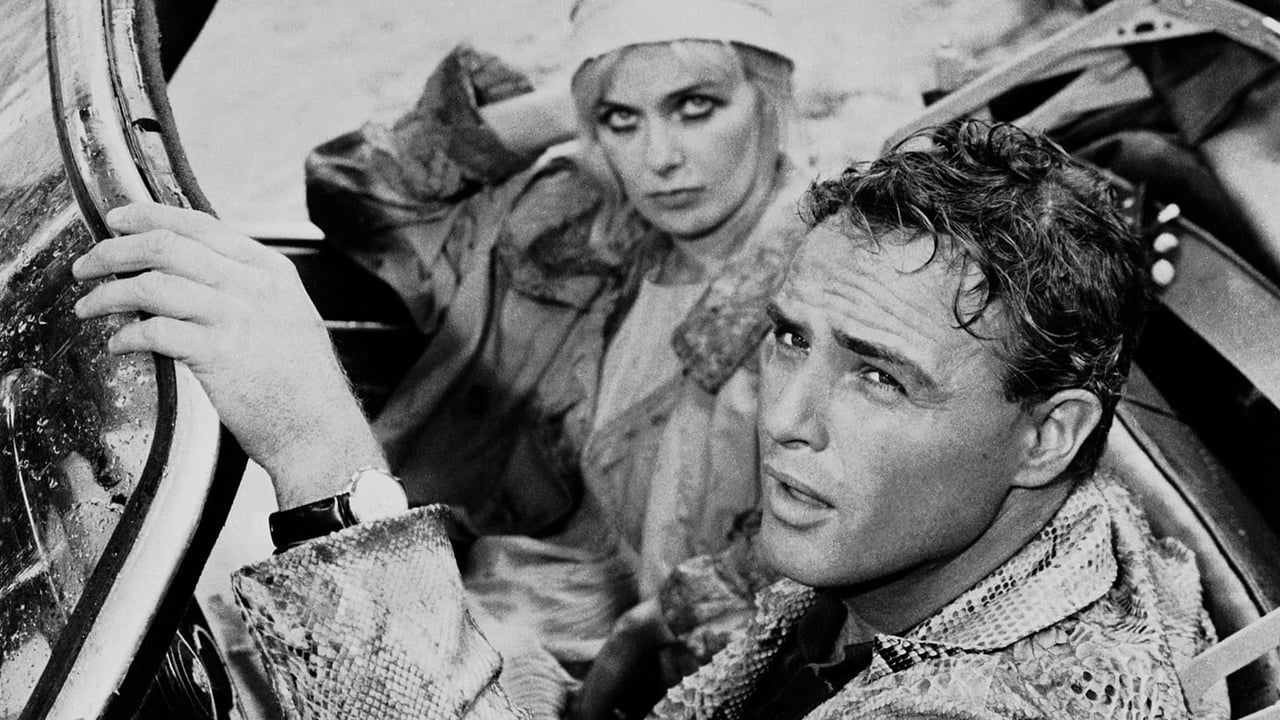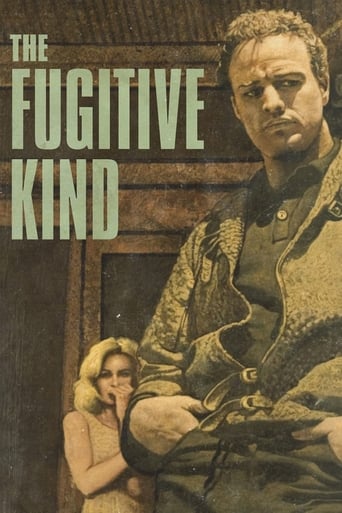Red-125
The Fugitive Kind (1960) was directed by Sidney Lumet. The movie is adapted from the play, "Orpheus Descending," by Tennessee Williams who also was co-writer of the script.In the classic tale of Orpheus and Eurydice, Orpheus is a musician, whose young bride Eurydice dies. Orpheus descends to the Underworld, where his music is so wonderful that he is allowed to bring Eurydice back from the dead. However, just as he is about to succeed, the plan fails, and Eurydice remains in the Underworld. Shortly afterward, Orpheus himself is killed.In the movie, Marlon Brando plays Valentine 'Snakeskin' Xavier, who is a musician, and who is symbolically Orpheus. Val arrives in a small town in the deep South, which, at the time, could certainly serve as a symbol of the Underworld. Anna Magnani plays an Italian shopkeeper, Lady Torrance, who is married to Jabe Torrance, a harsh, evil man, who is fatally ill. She could be Eurydice, although Williams gives us a second lost soul, Joanne Woodward as Carol Cutrere, a rich, beautiful young alcoholic. Woodward is always drunk, and always seductive. I think Williams perceived her as a life force, even if the life she was leading was self-destructive. (I don't see where she fits into the Orpheus and Eurydice tale, but there she is every so often--drunk and unable to drive home because, "The took away my license again.")According to IMDb, Brandon is considered the greatest film actor of the 20th Century. Maybe, maybe not. By the time this film was shot, he was 36, and his face had lost the sharp angles it had had in his earlier great films. He is treated in the film as a man no woman could resist, and maybe that was true in small-town Mississippi, but it was a stretch for me. Brando's great achievement was Method realism, and it didn't work for me in his film.The opening scene shows Val in court, being lectured by a judge. We can't see the judge-- the scene is shot from his POV. We see Brando mumbling his way through the questioning. "Yeah, I had to hock my guitar. I couldn't bear to think of my guitar being in hock, so I kinda broke up the place." "As soon as I get my guitar out of hock, I'm leaving New Orleans." I found the scene painful.The question is, Why see the picture at all? See it for Magnani. Magnani plays a middle-aged woman, who falls in love with Brando, as expected. A reasonable choice for her under the circumstances, but not a wise one. Magnani was often compared to Sohia Loren. They were both Italian, and both beautiful, but that's where the similarity ends. Loren was impossibly beautiful. Magnanii had a beauty that was not impossible. You can imagine her as someone you might encounter, even at the in a mercantile store in the deep South. Her acting was superb. She was a strong person, but the circumstances forced her to be far less than she could have been.Some films from 1960 appear as alive as they did when they were made. The Fugitive Kind feels dated--almost a classic movie whose time has passed. However, it's worth seeing for Magnani's outstanding, exactly right, performance. The film is mostly shot indoors, and will work on DVD. It's a part of movie history, and is worth seeing, but don't expect a timeless masterpiece.Note: Look for Maureen Stapleton as Vee Talbot, who is so downtrodden by her sheriff husband that she has left the real world and escaped into her own world of painting.Note: If you want to see the Orpheus legend truly captured on film, watch Black Orpheus, set in Brazil during Carnival. It's adheres to the Orpheus legend much more closely, and you care more for the characters.
Bob Taylor
I am not the man to give a long analysis of Tennesee Williams's career, or assess his stature in the American theatre. All I can do is give an account of what I felt watching this movie. Time weighed heavily on me through most of the running time. I could not care very much about Val and Lady, their travails with the corrupt social system of the south. Jabe Torrance is a monster, that much I was able to understand, but he seems more a Victorian villain than a store owner of the 1950's. Brando's heartfelt musings, aided by Boris Kaufman's sensitive cinematography, left me feeling hungry for more satire and sleaze.Fortunately (or I would have abandoned watching the DVD), satire and sleaze are amply supplied by Victor Jory as the rascally Torrance, R. G. Armstrong as the jovial and vicious sheriff, and the magnificent Joanne Woodward as Carol Cutrere, a "church-bitten reformer" who has been forbidden to drive her sports car in the county, and hankers after Val. Her unbridled sexuality and destructive whimsy make the movie take off; pity she has only a few scenes. The juking monologue is a classic. What's juking? "Well, that's when you get in a car, preferably open in any kind of weather. And then you drink a little and you drive a little..." For a moment I was thrust forward to the Warhol world of the Sixties, with the likes of Edie Sedgwick, Ultraviolet and Viva!
bobvend
Mixing Brando and Tennessee Williams will always result in something both languid and explosive. "The Fugitive Kind" serves up the genuine article in this typically bizarre, implausible yet intensely watchable film. Sure, it's slow at points and some of drama is over the top, but the entire cast inhabits their characters with gusto even though most of them are more pathetic than sympathetic. I particularly liked Victor Jory's portrayal of the sinister sleazy perpetually-sweating Mr. Torrance.But the active ingredient here is Anna Magnani. Earthy, volatile and relentless in her ferocity. She tears up the scenery (almost literally) in every scene in which she appears, even when she's doing nothing more than staring at what she seemingly struggles to comprehend. It's abundantly apparent why she was a favorite of Williams. She's the one to watch!

